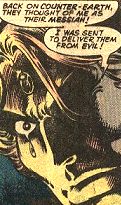 Adam
Warlock vs. the Magus
Adam
Warlock vs. the Magus
(Strange Tales #178-181, Warlock #9-11, 1975)
Additional notes: This saga has been reprinted more than once. In
1980 it ran in Fantasy Masterpieces (series 2) #8-14 (along with
Silver Surfer reprints). And then Jim Starlin's complete Warlock stories
were reprinted in a 1983 mini-series Warlock: The Special Edition,
and re-reprinted again in 1991 as, simply, Warlock. Both series
ran six issues, of which this saga occupied the first three. As well, I
read some place that Starlin's Warlock was collected in a TPB...but
I've yet to confirm that.
Written and Illustrated by Jim Starlin.
Space-faring Adam Warlock encounters a self-styled God, the Magus, ruler
of an oppressive, systems-spanning religious empire. Worse, Warlock suspects
that Magus is actually the dark-side of his own id, somehow free and wreaking
havoc on the innocent. Well, things are even more complicated -- and stranger
-- than that, and it sends Warlock on a weird epic, part two-fisted adventure,
part metaphysical cosmic odyssey, as he seeks to battle his "holy" alter
ego.
 If
Captain
Marvel was Jim Starlin's training ground, this mix of fantasy, SF,
and super-heroics was his graduating thesis. Starlin's dialogue and art
is superb, his story is complex and full of unexpected twists, his art
heavy on brooding shadows with striking panel compositions and enthralling
sets. The saga is off-kilter, brooding, satirical, funny, provocative (with
its rumination on good and evil, religion, justice, etc.), surreal, haunting
and just plain brilliant -- not to mention fast paced and fun. Even comic
relief sidekick, Pip, works. In some respects, Starlin was clearly influenced
by British fantasy writer Michael Moorcock with Warlock as the melancholy
hero, a pawn of cosmic forces he doesn't understand, but he goes way beyond
Moorcock in his mind-shattering scenario. It's pure adolescent angst --
but good adolescent angst (after all, half of Shakespear's plays are aimed
at the adolescent in us all).
If
Captain
Marvel was Jim Starlin's training ground, this mix of fantasy, SF,
and super-heroics was his graduating thesis. Starlin's dialogue and art
is superb, his story is complex and full of unexpected twists, his art
heavy on brooding shadows with striking panel compositions and enthralling
sets. The saga is off-kilter, brooding, satirical, funny, provocative (with
its rumination on good and evil, religion, justice, etc.), surreal, haunting
and just plain brilliant -- not to mention fast paced and fun. Even comic
relief sidekick, Pip, works. In some respects, Starlin was clearly influenced
by British fantasy writer Michael Moorcock with Warlock as the melancholy
hero, a pawn of cosmic forces he doesn't understand, but he goes way beyond
Moorcock in his mind-shattering scenario. It's pure adolescent angst --
but good adolescent angst (after all, half of Shakespear's plays are aimed
at the adolescent in us all).
Granted, the saga seems to be setting things up for later stories, but I read it (and re-read it many times) just by itself and still find it an extraordinary work.
The (admittedly little) stuff I've read that Starlin's done in the last
decade or so, often just a pale regurgitation of ideas first explored here
(and that's when he has any ambition at all) can make you forget what a
hot, edgy talent he had been in his salad days.
Back
 If
Captain
Marvel was Jim Starlin's training ground, this mix of fantasy, SF,
and super-heroics was his graduating thesis. Starlin's dialogue and art
is superb, his story is complex and full of unexpected twists, his art
heavy on brooding shadows with striking panel compositions and enthralling
sets. The saga is off-kilter, brooding, satirical, funny, provocative (with
its rumination on good and evil, religion, justice, etc.), surreal, haunting
and just plain brilliant -- not to mention fast paced and fun. Even comic
relief sidekick, Pip, works. In some respects, Starlin was clearly influenced
by British fantasy writer Michael Moorcock with Warlock as the melancholy
hero, a pawn of cosmic forces he doesn't understand, but he goes way beyond
Moorcock in his mind-shattering scenario. It's pure adolescent angst --
but good adolescent angst (after all, half of Shakespear's plays are aimed
at the adolescent in us all).
If
Captain
Marvel was Jim Starlin's training ground, this mix of fantasy, SF,
and super-heroics was his graduating thesis. Starlin's dialogue and art
is superb, his story is complex and full of unexpected twists, his art
heavy on brooding shadows with striking panel compositions and enthralling
sets. The saga is off-kilter, brooding, satirical, funny, provocative (with
its rumination on good and evil, religion, justice, etc.), surreal, haunting
and just plain brilliant -- not to mention fast paced and fun. Even comic
relief sidekick, Pip, works. In some respects, Starlin was clearly influenced
by British fantasy writer Michael Moorcock with Warlock as the melancholy
hero, a pawn of cosmic forces he doesn't understand, but he goes way beyond
Moorcock in his mind-shattering scenario. It's pure adolescent angst --
but good adolescent angst (after all, half of Shakespear's plays are aimed
at the adolescent in us all).
 Adam
Warlock vs. the Magus
Adam
Warlock vs. the Magus